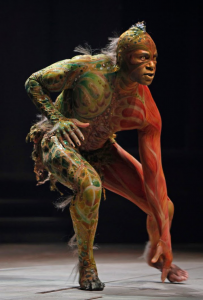Caliban
Source Text: Shakespeare, William. “The Tempest.” William Shakespeare: Collected Works. Ed. Jonathan Bate and Eric Rasmussen. London: Wordsworth Editions, 1996. 1135-1159.
Entry Author: Alexandra Katechis
Caliban of William Shakespeare’s The Tempest (1610-1611) is the half human and half beast native to the island upon Prospero and his daughter have adopted. This poem strives to emphasize the ambiguity of Caliban’s parentage. The poem also explores the many forms he might appear as (man, beast, animal, devil). The point of view will be first person, so that the speaker can draw the reader into the pain of being reviled and enslaved as a result of physical difference and suspected inferiority. Additionally, this poem attempts to emphasize the struggle between Caliban’s inner humanity and outer bestiality. Caliban’s aggressive voice is evoked in order to fully flesh out this sense of injustice which is so central to his humanness.
Caliban
Acerbic article of Algiers, I am the son of Sycorax, antithesis of Ariel, and yet
Brother. What family has not forsaken me, banished and abandoned me in basest beastly
Condition, which does cull cruelty from civility. When did censure reach such consensus?
Duke of Milan, Prospero, doest thou attend me? Thy crippled devil did befriend thee. This
Eden I ennobled onto you, you, who conducts the eulogy of my only claim to the
Flesh of this Earth. Foiled by my own manhood, which did enflame thy eyes before fruition:
Godless, ghastly love for Miranda, o gracious nonpareil, who gave me voice to groan,
Howl, hatch into this hostile realm. What hellfire has my humanity bought? Master,
Imposter, sinuous ivy of incantation and vile thought, ignominy of my inheritance, my isle.
Jealousy betrays this jape of justice, which does lengthen my jailor’s sentence of solitude.
King and keeper of my soul, strengthen the knot of thy goddess who does tempt me. Thy
Leal servant licks at lust and knows no limit to its loathsome breath which you have lent me:
Mooncalf monster, cry out the wicked; only good men mark my root in our maker’s mind. A
Naked native truth to which I am nailed, bound nose to navel by a plague of nymphs. The
Orphan obeys, instrument of this diabolical orchestra of occult hymns. And so
Perdition is my immortality, part served on this pelagic stage, the rest in pandemonium’s pit.
Quiet quivers of mine own heart do sometimes feign forgiveness, quintessence of thy fool’s wit.
Reason can no longer rebuke the rabid refrain of my repugnance, reborn the same in every
Strain of this savage’s story. Spirit, sprite, and simplest man: subject to the sorcerer of quill,
Trick and thrill, the madman’s slight of hand. Sing out my threnody, tale of a tyrannical torment.
Ugly underworld, ubiquitous cacophony, and my prison, molded from past paradise by the
Villain who knows naught else but to rule and part. I am the victim of the minister of fate
Whose rapture is my worldly woe, whose rejoice is bitterest curse and weakest foe.
Exculpate me, or else scorn this half-worn existence as do all others who drink his poison ink.
Yesterday’s heart can no more be broken. I have no other.
Zealotry has no parallel, no pardon.

